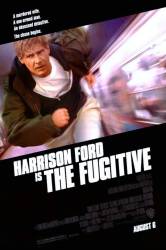Deliberate mistake: The dummies are obvious when the jail bus is flipping over onto the railroad tracks.

The Fugitive (1993)
1 deliberate mistake - chronological order
Directed by: Andrew Davis
Starring: Julianne Moore, Tommy Lee Jones, Harrison Ford, Joe Pantoliano, Sela Ward
Continuity mistake: Kimble dyes his hair very dark to escape detection and dyed hair fades over time. For the rest of the movie his hair noticeably goes from darker shades to lighter shades and back again showing that the scenes were shot non-sequentially on different days with a fair amount of time in between.
Richard Kimble: I didn't kill my wife!
Sam Gerard: I don't care. (00:37:10)
Trivia: When "Richard" starts to limp it wasn't planned, Harrison actually hurt a ligament in his knee shooting a promo for the movie, a promo that wasn't even part of the movie. He refused to receive treatment until filming was finished and ended up needing surgery.
Question: At the very end, what was in the plastic bag that Tommy Lee Jones' character gives to Harrison Ford?
Join the mailing list
Separate from membership, this is to get updates about mistakes in recent releases. Addresses are not passed on to any third party, and are used solely for direct communication from this site. You can unsubscribe at any time.
Check out the mistake & trivia books, on Kindle and in paperback.




Answer: It's a cold compress. You squeeze it, and the inner bag breaks mixing chemicals and it gets very cold. It helps to minimize swelling. He gave it to Kimball for all the bruises he had.
Grumpy Scot